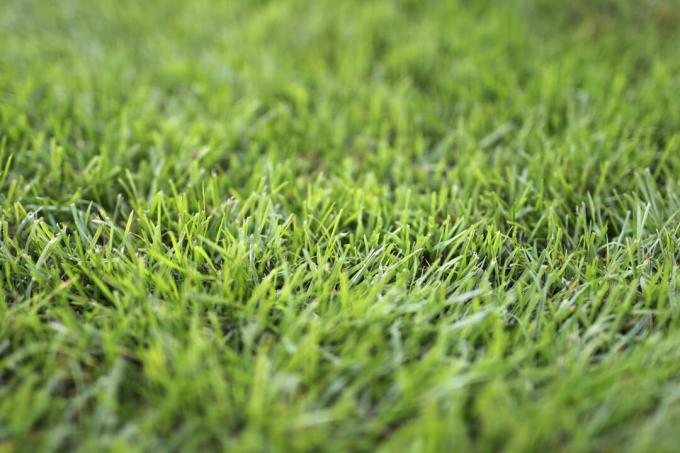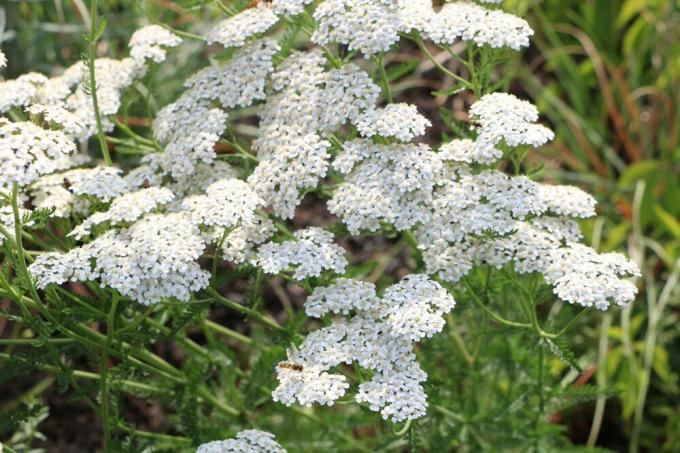

Table of contents
- Nitrogen
- phosphorus
- potassium
- magnesium
- Organic composition
- mineral composition
- Organic-mineral composition
Lawns should be lush green and sprout densely. The more blades of grass grow per square meter, the more beautiful the lawn looks. However, without a potent lawn fertilizer, the grasses quickly become unsightly and brown spots spread. In addition, there is the rampant growth of weeds. A holistic lawn fertilizer is ideal, in which the ingredients and composition are tailored to the different purposes.
Nitrogen
Nitrogen is an important ingredient in lawn fertilizer. This nutrient provides the foundation for plant growth. Through the use of nitrogen, the grass grows much faster and even denser. However, when using it, care must always be taken to ensure that over-fertilization does not occur. Nitrogen leads to a high level of nitrate pollution in the soil, which is why the fertilizer may only be applied according to the existing need. If too much of the ingredient is used, then this nutrient will not be fully utilized by the grasses in the lawn. The fertilizer then seeps into the local groundwater in the form of nitrate, causing the nitrate levels there to increase dramatically.
- Promotes growth and regeneration of grasses
- Also supports the growth of the root mass
- Provides a radiant green colour
- Is necessary for fertilizing in spring and summer
- Only use during the growth phase
- Do not apply any more nitrogen-rich fertilizers in autumn
Tip:
If the lawn is trimmed often and deeply, then the need for nitrogen increases significantly.
phosphorus
Phosphorus is an important supplier of energy and plays a key role in regulating the metabolism of lawns. This ingredient is very important for the roots, especially when they are supposed to regenerate. Thanks to strong roots, the lawn has improved shear resistance, allowing it to recover faster after each cut.
- Promotes sustainable root growth
- Ideal for a newly laid lawn
- Lowers the pH of the soil
- Bone meal contains phosphorus
- Apply immediately after scarifying
potassium

When the days get hotter and longer towards the end of spring, the need for nutrients in the lawn gradually changes. At this time of year, the lawn is also used much more frequently, so that the summer months are a tough time for the lawn. Therefore, an adequate supply of potassium is very important. This ingredient deeply protects the grasses from drying out and prevents burns that can occur during intense midday heat. In combination with nitrogen, potassium significantly improves the lawn's ability to regenerate. In this way, the grasses also receive lasting protection against harmful environmental influences.
- Potassium strengthens the cell walls of grasses
- Improves strength in plant tissue
- Grasses become significantly more resilient
- Controls the water balance in the lawn
- Protects against dry phases
- Significantly increases resilience
- Lawn becomes more resistant to frost
- Reduces disease infestation
- The ideal time for fertilizer with a lot of potassium is in autumn
magnesium
Magnesium is of central importance in lawn care as this ingredient is essential for the formation of chlorophyll. If there is not enough chlorophyll, the grasses cannot carry out photosynthesis. Magnesium occurs naturally in garden soil. However, this nutrient occurs more on medium-heavy and heavy soils. On the other hand, magnesium is often in short supply on light, sandy and acidic soil qualities. In addition, this nutrient is washed out of the soil every year by rainfall and irrigation. But plants also extract a lot of magnesium from the soil through the constant uptake of nutrients.
- Magnesium strengthens the health of grasses
- Colors the blades of grass rich green
- Prevents unsightly yellowing
- Lawn fertilizers contain magnesium sulfate
- Ingredient is also known as Epsom salt
Organic composition
Organic lawn fertilizers consist mostly of plant and animal waste products. The mode of action is based on the transformation of organic ingredients. Since the active ingredients in organic fertilizers must first be converted by the organisms in the soil, they take a long time to become effective. If the lawn is only completely organically fertilized, then this approach is too one-sided and too poor in nutrients in the long run. This leads to an undersupply of the grass and moss can spread faster. Therefore, organic lawn fertilizer should always be used in addition to other fertilizers.
- Organic lawn fertilizer improves the soil structure
- Makes the soil much more fertile
- This includes horn shavings, which provide a lot of nitrogen
- Bone meal contains large amounts of phosphorus
- Spent grains are malt residues from beer production
- Molasses is also good
- Just like sterilized chicken manure
- Organic ingredients only work after approx. 4-6 months
mineral composition

Pure mineral lawn fertilizers are characterized by a very short duration of action, as they are very quickly soluble. These fertilizers have no harmful effect on soil life. However, if only mineral fertilizers are used, this leads to permanent deficiency symptoms. As a result, weed growth increases. As a liquid fertilizer, mineral ingredients are very helpful in lawn care. As a result, unsightly turf can be sustainably improved within a short time. Mineral fertilizers as capsules do not work in a timely manner, but depend on the right weather conditions.
- Also known as artificial fertilizer
- Generally intended for green manure
- However, it is not sufficient as a sole lawn fertilizer
- Blue grain is one of the purely mineral fertilizers
- Artificial fertilizers are already effective after 2-5 days
- However, the effect lasts for a maximum of 2-3 weeks
- Mineral liquid fertilizers are ideal
- Also available as a long-term fertilizer in capsule form
- Capsules only work when it rains
- Alternatively, water copiously to speed up effectiveness
Tip:
Over-fertilizing with a purely mineral lawn fertilizer can lead to serious burns on the lawn. Therefore, never use too much artificial fertilizer.
Organic-mineral composition
Organic-mineral lawn fertilizers offer an almost perfect composition for lawn care. Due to the mineral content, the vital nutrients are immediately available. Thanks to the organic components, there is permanent efficiency. An even supply of nutrients promotes and maintains the health of the lawn. Conducting a soil analysis is a good way to get the exact nutrient requirements of the lawn. In this way, exact quantities of the individual ingredients that are needed per square meter can be calculated.
- Combination represents ideal composition
- Improves soil life
- Increases soil fertility
- Can be used throughout the growing season
- Test kit for soil analysis is sold at the pharmacy
 garden editorial
garden editorial I write about everything that interests me in my garden.
Learn more about lawn care

Sanding the lawn: how much sand per m²?
The lawn is the focal point of the garden. Sanding the lawn can effectively influence its appearance. However, there are a few things to consider, because too much of it can also damage the green. Read here how much sand you should apply per m² when sanding the lawn.

Overseed the lawn without scarifying?
Which hobby gardener doesn't dream of a dense, lush green lawn? Bald spots not only look unsightly, they also encourage weed growth. But can you overseed a lawn without scarifying it first?

Recognize and fight couch grass successfully | 10 tips
Couch grass is one of the most stubborn weeds. However, there are also differences here, because not every species becomes a problem in the garden. However, if the creeping or common couch grass is up to mischief, you can take action against it with perseverance and the right techniques.

Iron fertilizer: the right use in the lawn
Iron fertilizer supplies the lawn and works against moss. However, it has to be used correctly. Therefore, observe the following tips to achieve optimal results for the grass plants and to avoid damage to the meadow.

Does coffee grounds help against clover in the lawn?
Clover in the lawn is a nuisance that many garden owners struggle with. Lawns, which in some cases are interspersed with numerous nests, are often affected. As an alternative to chemical agents, many wonder whether coffee grounds are effective against weeds.

Yarrow in the lawn | How do I get rid of yarrow?
There is no question that yarrow is one of the best-known medicinal herbs. It helps against colds and is used for skin diseases and gynecological problems. On the manicured lawn, she is seen as a troublemaker. How do you get rid of them? Are there effective alternatives to the chemical club?



